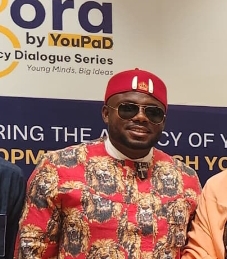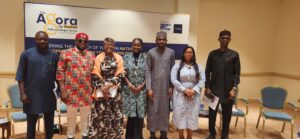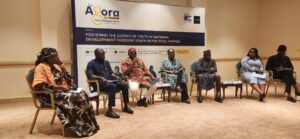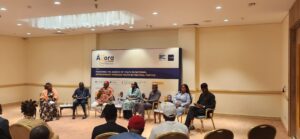FOSTERING THE AGENCY OF YOUTH IN NATIONAL DEVELOPMENT THROUGH YOUNG PEOPLE IN POLITICAL PARTIES IN NIGERIA: REFLECTIONS AND LESSONS
(Presentation at YouPaD Public Policy Conversation organized by The Friedrich Ebert Stiftung (FES) in collaboration with the Young Professionals in Policy and Development (YouPaD) on October 17, 2024 at Abuja Continental Hotel, Abuja)
By Dr. Nelson Omenugha, mnipr
Mr. Resident Representative, Lennart Oestergaard and Team at Friedrich Ebert Stiftung (FES),
The Management and Team at Young Professionals in Policy and Development (YouPaD),
Relevant Youth Stakeholders and Participants,
The Moderator and Fellow Lead Discussants,
Members of the Press,
Ladies and Gentlemen.
First, let me express my pleasure at this programme intentionally designed to interrogate and discuss the complexities of challenges facing young people in Nigeria, particularly with political engagement and participation. The theme “Fostering the Agency of Youth in National Development through Young People in Political Parties in Nigeria” is timely and has proved to be an added incentive for my willingness to attend and participate in this session. For records, I have been in active youth work since my 15 years at my secondary school and local church. At 17 and in my second year of study, I was elected President of the Students’ Union Government, Nnamdi Azikiwe University, Awka. Then, I deeply engaged, mobilized and inspired fellow students to embark on several programmes of impact, including “save the mother-earth” initiative, “donate blood to save a life” drive, “read to inspire” competition and students’ leadership training. Today, I am the Special Adviser to the Governor of Anambra State, Prof Charles Chukwuma Soludo CFR, on Youth Empowerment Programme as well as Convener of Youths Earnestly Seek Solution (YESS) (formerly Youths Earnestly Seek Soludo), an answer-focused movement of young people advocating good governance, youth participation in the political process and for the holistic solution to the challenges facing young people in Nigeria, including youth unemployment, restiveness and social exclusion.
Established in July 2019, YESS was actively involved in galvanizing, mobilizing and harnessing the support and goodwill of the people towards the eventual successful election of the incumbent Governor of Anambra State, Prof. Charles Chukwuma Soludo CFR on November 9, 2021, under the All Progressive Grand Alliance (APGA) political party platform. The youths’ involvement, prior and during electioneering, were central to Soludo’s victory at the poll. It is therefore important to note that my active involvement in youth work over these years has brought me closer to the real issues of the youths, including their frustrations, pains and challenges. To put it in context, if I engage 10 young people a day, 8 of them would largely be talking about being unemployed/underemployed, unskilled, financially challenged or facing one issue or the other. I have lost count of times I hear things like; “I am a university graduate but have no job”, “I am struggling to pay my school fees”, “I need a place for my IT”, “I got into drugs and alcoholic abuse to suppress depression”, etc. Indeed, the challenges facing the youths abound; but do we continue to read the book of Lamentation? I certainly do not think so. For one, I believe in the infinite energies and possibilities of the Nigerian youths. I believe that whatever challenges that youths face can only be unpacked and solved by the youths themselves. No one else would. Therefore, a forum like this is exciting and for me, an opportunity for us to co-create and co-claim values; thinking through our challenges and providing actionable solutions.
Reflecting on the conversation theme “Fostering the Agency of Youth in National Development through Young People in Political Parties in Nigeria”, one would ask; what is Youth Agency? For me, it refers to the capacity of young people to act independently, make their own choices, and influence the development of the society they live in. There are five finger-areas I considered that the youths can be involved, actively contributing to the political cum socioeconomic development of the country. They are:
1. Election Contest
2. Political Appointment
3. Advocacy and Civil Society Work
4. Entrepreneurship
5. Political Party, which this session is focused on.
In Nigeria, the youth population, those between the ages of 18 and 35, constitutes a significant portion of the population – approximately 60% of the entire demographic structure. Given the sheer size of this group, it is clear that they have a crucial role to play in shaping the future of the country. However, this potential is often untapped due to limited access to political platforms and barriers to entry within Nigeria’s political space. The political landscape remains largely dominated by older generations, leaving the youth with limited roles in shaping national policies and contributing to national development. Notably, the inclusion of young people in political parties, and subsequently in national governance, presents an opportunity to foster their agency in driving sustainable development and addressing socioeconomic challenges that affects them.
Thus, political parties serve as a critical avenue through which youths can influence national development. By being active participants within these structures, young people can bring their concerns, ideas, and innovative solutions to the forefront of the national agenda. It is imperative, therefore, to look at how fostering youth agency in national development can be realized by encouraging greater youth participation within political parties in Nigeria. It is also important to look at the challenges faced by the youth in this regard and propose a way forward, supported by practical examples. In a party-based democracy like ours, political parties hold the future of involvement of young people in the entire polity.
Youth as critical enabler of National Development
The role of youths in national development is pivotal. Young people bring dynamism, innovation, and energy that are crucial for economic growth, technological advancement, and social transformation. Historically, youths have been the drivers of innovation, societal reform, and progress. Nations that have tapped into the potentials of their youths have witnessed significant strides in development. For example, countries like Singapore and South Korea have harnessed the innovative power of their young populations to transition into highly developed economies. In national development, the involvement of youths brings new perspectives, energy, and a willingness to challenge the status quo. Youths are typically more adaptable to new technologies and global trends, allowing them to push for modernization and reforms in ways that older generations may resist or struggle to grasp.
In Nigeria, the contributions of the youth are critical across various sectors — education, agriculture, technology, and entrepreneurship. They are at the forefront of the country’s booming tech industry, leading in areas such as fintech, e-commerce, and digital media. However, this dynamism has not been effectively translated into political leadership, where the youth remain largely marginalized. For meaningful national development to occur, young people need to be key stakeholders in decision-making processes, particularly within political parties, where policies and political leadership structures are shaped.
Challenges Facing Youth Participation in Political Parties
Despite the clear need for youth involvement, several challenges inhibit their active participation in political parties. These challenges are multifaceted and rooted in Nigeria’s political history, societal structures, and institutional practices. Some of the most notable barriers include:
1. Age-Based Discrimination and the Culture of Gerontocracy:
One of the most prominent challenges is the deep-rooted culture of gerontocracy, where older politicians dominate the political landscape, leaving little room for young people to rise to leadership positions. Many political parties in Nigeria are structured in a way that prioritizes seniority and age over competence or innovative ideas, creating a situation where young people are often sidelined or used merely as foot soldiers during elections without opportunities for substantive leadership roles. We have 19 registered political parties in Nigeria today. Lets take a look at their political leadership structures and see how many young people (between age 18 to 45) holding positions. You will even be shocked to find out that in some of these political parties, Office of the National Youth Leader is not being occupied by a youth. My party, APGA prides itself as having over 40% of her National Working Committee members to be young people, starting from the National Chairman, Barr. Sly Ezeokenwa to the National Publicity Secretary and down to the National Youth Leader.
2. Lack of Access to Financial Resources:
Politics in Nigeria is heavily monetized, making it difficult for young people, who often lack financial resources, to compete for political positions. From purchasing nomination forms to funding campaigns, the financial demands of the political process and the general cost of gaining visibility within political parties and electorates are prohibitive for many young Nigerians, especially in a country with high youth unemployment rate. Political party structures often favor candidates who can bankroll campaigns, which puts the youth at a disadvantage as they often lack the financial resources to compete with older, wealthier politicians. Again, APGA is tackling this challenge with her recent gesture of giving out nomination forms at no cost to persons who were interested in contesting for any party leadership position and even in the recently concluded Local Government Election held in across States of the federation.
3. Political Violence and Intimidation:
The political climate in Nigeria is often characterized by violence, intimidation, and thuggery, particularly during election periods. Youth who seek to engage in political processes are sometimes co-opted into these violent systems, either as perpetrators or as victims, which discourages genuine political participation. Because of the volatile nature of our politics, greater number of progressive young people I had interacted with, consider the risks associated with political involvement as outweighing the potential benefits. Nevertheless, I believe in the popular Edmund Burke’s dictum that evil thrive when men of goodwill keep quiet. The progressive youths must not shy away from getting involved with the political processes. It is a duty we owe ourselves. By getting involved, we would be able rescue our politics from the evil hands.
4. Limited Political Education and Awareness:
Many young people in Nigeria lack adequate political education. The political system is complex, and without a clear understanding of how it functions or how to effectively engage within it, youths are often alienated from the process. While social media has provided a platform to discuss political issues, it does not always translate to meaningful engagement within political parties, where the decision-making takes place. Political Parties in Nigeria are not living up to their duties. One gets to feel their presence only during General Electioneering and soon after the Election, they all hibernate. No political party talks about or has taken the initiative to educate the people about the letters of their manifesto. No political party has even taken the step to intentionally recruit and mentor young people in universities, like in the old days of Great Zik of Africa (NCNC Party), Alex Ekwueme (NPN Party). In those old days, political parties have clubs across the Universities and there, students debate manifesto of the political parties to make informed choices. Then, political parties were movement and intellectually driven. Today, the clubs are all gone. There is no known system of recruiting informed young persons that would take over the leadership of the political parties. Party leaders decamp and return to the party at will. No party discipline, no value.
5. Patriarchal Structures and Gender Discrimination:
Within political parties, the female youth faces a double burden of ageism and sexism. The Nigerian political space is highly patriarchal, and young women, in particular, face greater challenges in gaining recognition, access to resources, and leadership roles within political parties. Apart from Women Leader position, we can count how many positions are reserved and occupied by women across the political parties in Nigeria. This trend has to change for inclusiveness and overall development of our polity.
6. Intra-party Politics and Lack of Internal Democracy:
Many Nigerian political parties lack internal democracy, making it difficult for youths to rise through the ranks, based on merit. The selection of candidates for political positions is often determined by a few powerful individuals within the party, rather than through open, transparent, and competitive processes. This limits opportunities for youths who do not have the necessary political connections or influence within party hierarchies.
7. Weak Internal Democracy in Political Parties:
Many Nigerian political parties are characterized by weak internal democratic structures, where decisions are made by a few elite members, leaving the majority, including the youth, marginalized. Party primaries, which are meant to be a democratic process of selecting candidates, are often influenced by powerful stakeholders and “godfathers” who impose their preferred candidates, sidelining young aspirants. This lack of transparency and inclusiveness within political parties discourages youths from active participation.
8. Godfatherism Syndrome:
Politics in Nigeria is laced with Godfathersim syndrome where older politicians who pose as mentors always stand to decide the fate of their protégés if they eventually ascend any political office which leads to political war if such “political son” refuses to play by the dictates of the Godfather. Case in point is Rivers State. The ongoing rift between Nyesom Nwike and Sim Fubara is a practical and most recent example.
Some Practical Case Studies of Youth Engagement in Nigeria Politics
Despite the challenges, there are examples of youth who have successfully navigated the political landscape in Anambra State and contributed to national development. These examples highlight the possibilities for fostering greater youth involvement.
1. The Election of Prof. Charles Chukwuma Soludo and Youth Mobilization:
The year 2021 election of Prof. Charles Chukwuma Soludo as the Governor of Anambra State was a significant political event, not just for its outcome but for the role that youths played in mobilizing support for his candidacy. Soludo, an economist and former governor of the Central Bank of Nigeria, attracted a broad base of support from young voters (including YESS members), who saw in him a candidate capable of driving economic development and job creation. Youth involvement in Soludo’s campaign was instrumental in his victory, particularly through grassroots mobilization and social media engagement. This underscores the potential power of youths in shaping political outcomes when they are actively involved in the process. I shall come back to this experience shortly as it demonstrated something very vital regarding how youth participation in politics can be best realized.
2. “Not Too Young to Run” Initiative:
The “Not Too Young to Run” campaign, which culminated in the 2018 amendment of the Nigerian Constitution, is a landmark achievement in the fight for youth inclusion in politics. The constitutional amendment lowered the age requirements for running for elective offices – reducing the minimum age for the president from 40 to 35, and for governors and senators from 35 to 30. This movement, driven primarily by youth-led organizations, demonstrated the power of collective youth action in influencing national policy and opening doors for more young people to participate in politics. In Anambra State, young people are being elected and appointed into critical political party and government positions, thanks to the Governor, Prof Charles Chukwuma Soludo of All Progressive Grand Alliance (APGA) political party.
3. Youth in Local Governance and Civil Society:
In the just concluded Anambra state and Enugu state local government elections, majority of the elected Council Chairmen and Councilors are all young people (between age 18 to 45), indicating the possibility of active youth involvement in national development when this is translated in the various local government areas in Nigeria. Beyond formal political parties, Nigerian youth have also made significant contributions to national development through advocacy and civic engagement, particularly in movements like #EndSARS, which called for police reform and an end to police brutality. This movement, led predominantly by young Nigerians, demonstrated their ability to organize, mobilize, and demand accountability from the government. While not directly tied to political parties, this movement showcased the political consciousness and agency of Nigerian youth.
The Imperative of Political Parties as a Vehicle for Youth Participation in Politics: My Experience with YESS
As earlier stated, the emergence of Prof. Charles Chukwuma Soludo as Governor of Anambra State owes so much to youth involvement. Among the various platforms (support groups) that mobilized support for his election was notably Youths Earnestly Seek Soludo (YESS) which I convened. Formed July 2019, this Soludo advocacy group, being affiliated to no particular political party, drew its membership from young people who belonged to various political parties and even those who belonged to none. Even though that Soludo we set out to support is of APGA, our young men and women kept their political and faith differences aside and became united by one single goal – realizing the governorship ambition of a man (Soludo) they trust as having what it takes to deliver a different brand of leadership. YESS introduced the novel politics of stakeholding, where the youths were inspired and mobilized to invest their 3Ts – Time, Talent and Treasure – towards ensuring that Soludo emerges the Governor. The idea was to inspire patriotism among the young people, such that political participation is seen as a call to serve homeland. Our stakeholding approach discouraged vote selling and buying, transactional and bread-butter politics. Eventually, after over two years of intense and persistent grassroots mobilization, YESS and other support groups saw their lofty dream become reality.
However, the way the whole electioneering thing eventually panned out has left me with a very important lesson – the imperative of political parties in effective political participation. Once Prof Soludo secured the ticket of APGA, it became strictly a party affair as all the electioneering processes came completely under the party control. Each of the several support groups had to subsume itself under APGA for a united final push towards realizing a Soludo governorship. Any that failed to do this would have deprived itself of relevance and risked being excluded. Why was it so? The answer is simple: the modern democratic tradition makes political parties a fundamental part of the political set-up such that anyone seeking to directly exercise power at any level should participate in political parties. Thus, today, many YESS members who either belonged to other political parties or belonged to none have become members of APGA. No one prompted them to do so, they were prompted by the reality they experienced. So the lesson is distinctly clear for our youths of today: If you want to make a difference and contribute to nation building, join a political party!
The Way Forward: Solutions for Fostering Youth Agency in Political Parties
To overcome the aforementioned challenges, a multi-faceted approach is required. Below are key strategies that can help foster greater youth participation in political parties, thereby enhancing their agency in national development:
1. Institutionalizing Youth Quotas in Political Parties:
As earlier stated, participating in political parties is a vital route to power for the youth. Consequently, one practical solution to the problem of deficit in youth political participation is institutionalization of youth quotas within political parties. Just as gender quotas have been used to promote female representation, youth quotas can ensure that a certain percentage of leadership positions within parties are reserved for young people. This will guarantee that young voices are heard and that youth have direct influence on policy formation and decision-making processes.
2. Reducing Financial Barriers to Political Participation:
Political parties need to reconsider the financial barriers that prevent youth from participating in politics. This could include making the nomination form fee free or reducing the fee for young aspirants or creating youth-focused political funds that can provide financial support to young candidates. Additionally, political parties can partner with NGOs and international organizations to provide training and financial assistance to young aspirants, ensuring they have the resources necessary to compete.
3. Political Education and Mentorship Programs:
Investing in political education for young people is crucial. Political parties, civil society organizations, and the government should collaborate to provide programs that educate youth on political processes, leadership, and governance. Furthermore, establishing mentorship programs that link experienced politicians with young aspiring leaders can help build the skills and confidence necessary for youth to navigate the political landscape. Youth Leadership Development Programme such as Legislative Mentorship Initiative (LMI) founded by the Speaker of the 9th House of Representatives, Rt Hon Femi Gbajabiamila presents a model for political parties to understudy and deploy. Most importantly, political parties should make their manifesto public and offer room for public interrogation. Political parties clubs should be reestablished across universities in Nigeria.
4. Promoting Non-Violence in Politics:
Political parties must take a stand against the culture of violence in Nigerian politics. Youth should be trained and encouraged to engage in peaceful, issue-based campaigns, and political parties should sanction members who promote or engage in violence. The government and security agencies also need to create a safe environment where young people can participate in politics without fear of intimidation. Our electoral laws must come hard on any election violator.
5. Empowering Female Youth in Politics:
To address the gender imbalance within political parties, it is essential to create specific platforms and support systems for young women. Political parties should adopt policies that not only promote gender equity but also actively encourage the participation of young women in leadership roles. This could include providing mentorship programs for female youth and ensuring that gender is factored into any youth quota systems.
6. Strengthening Internal Democracy within Political Parties:
Political parties must embrace internal democracy to ensure that all members, including youths, have an equal opportunity to participate in decision-making processes. This involves transparent processes for candidate selection, party leadership elections, and policy development. Internal democracy will help to dismantle the patronage systems that currently limit youth participation.
Conclusion
Fostering youth agency in national development through political party engagement is essential for the progress and modernization of Nigeria. This is incontestable for a nation experiencing youth bulge, where about 70% of the entire population are under 30 years and 42% are under 15 years, meaning that youth participation is the fulcrum of democracy and political inclusion in the country. For emphasis, the country’s youth are its most valuable resource, and their participation in political processes is crucial for the creation of policies that are reflective of the needs and aspirations of the larger population. By addressing the challenges young people face in entering the political space and implementing strategic reforms, Nigeria can create a more inclusive, dynamic, and forward-looking political system that leverages the full potential of its youth population.
The way forward is clear: political parties, the regulator (Independent National Electoral Commission – INEC), government, and civil society must intentionally collaborate to break down the barriers that inhibit youth participation (as earlier encapsulated in this thesis). With the right structures and policies in place, Nigeria can unlock the transformative power of its youth, paving the way for sustainable national development driven by the next generation of leaders. The time for action was yesterday.
Thank You All for Listening.
Dr Nelson Omenugha, mnipr
Special Adviser to the Governor of Anambra State on Youth Empowerement Programme
Convener, Youths Earnestly Seek Solution (YESS)
nomenugha@gmail.com












